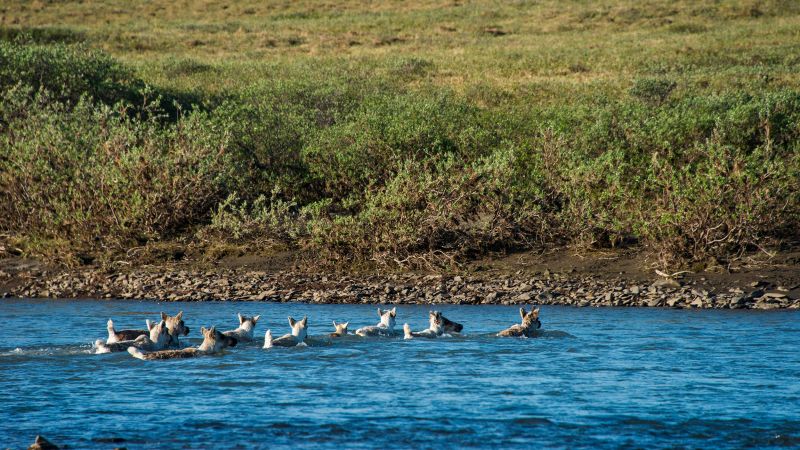Editor’s Note: Quannah Chasinghorse is a Han Gwich’in and Sicangu/Oglala Lakota land protector, climate justice activist, and fashion model from Eagle Village, Alaska and the tribes of South Dakota. She’s on Teen Vogue’s magazine Top 21 models under 21 list and the 2022 Forbes 30 under 30 list. The views expressed in this commentary are her own. View more opinion on CNN.
CNN
—
Before becoming a fashion model – which was my dream since childhood – I was on my journey as a land protector. My journey did not start with advocating against big oil from developing in the Arctic National Wildlife Refuge – it began with my upbringing by my matriarchy. As a child, I was taught to respect water, land, and our animal relatives, all of which are central to preserving our culture and way of life.

Growing up, I didn’t see people who looked like me in magazines and on runways, and thought my modeling hopes were futile. Today, with those dreams fulfilled, I am honored to walk the runway as a proud Hän Gwich’in woman who carries the strength of my ancestors and a responsibility to my people – and Indigenous Peoples everywhere.
I am where I am now thanks to many strong Indigenous women who came before me and who are doing the work today. Today, some of those women leaders in the community of Nuiqsut, Alaska are seeing their way of life threatened by the massive ConocoPhillips Willow Project.
The proposed Willow Project is the largest oil project proposed on public lands in the country. Located in a remote region of the Western Arctic that has been experiencing dramatic climate change impacts, this project would pave the way for ConocoPhillips to develop a drilling operation aiming to get the around 600 million barrels of oil in the area for decades into the future.
ConocoPhillips has claimed that the Willow Project could create thousands of construction jobs and hundreds of permanent ones, along with needed oil, but at what cost? It is the local Inupiaq communities who would bear the brunt of the negative impacts. Why are we as Indigenous people continually told that we must sacrifice our lands, our way of life and health for other people’s jobs and the nation’s oil dependence?
Make no mistake, it will not only be local communities, or even Alaskans, who will feel the negative climate impacts of this project. According to an analysis from the Center for American Progress, developing and burning oil from the Willow Project would produce up to 287 million metric tons of carbon dioxide over the next 30 years. That’s equal to the annual emissions of 76 coal power plants — a third of all coal plants in the United States.
President Joe Biden’s administration is expected to announce a decision on the project this week. Any version of this project threatens to produce that level of emissions and more. It must be stopped.
As someone whose homelands are in Alaska and who has experienced firsthand the impacts of climate change, the threat this massive and destructive project creates hits close to home for me. I have been inspired by the bravery of the community of Nuiqsut, Alaska, who are speaking out against the project, which is just miles from their homelands, threatening their way of life, food security and wellness.
And while this project may be across the Brooks Range from my people, the ecosystems and wildlife of these landscapes do not know western boundaries. Pollution and contamination do not know western boundaries. This project could destroy vital habitat for native species, like the caribou. Nuiqsut is fighting for these lands because they are also fighting on behalf of the caribou, the same food source I grew up eating.
Nuiqsut has also experienced firsthand the real and distressing threat to local communities that come from the risk of gas leaks and oil spills. In 2022, ConocoPhillips’ took months to respond to and repair a major gas leak on Alaska’s North Slope near Nuiqsut. Community members experienced significant impacts, and the lack of response from ConocoPhillips raised questions by lawmakers, which remain unanswered, about how they would prevent a similar disaster if the Willow Project were to move forward.
That is why I’m raising my voice against this project and I’ve been inspired by the chorus of voices who have joined me. Over the last week, millions of fellow young people have taken over TikTok to express their opposition to the Willow project, particularly in light of President Biden’s ambitious climate goals and promises on the 2020 campaign trail.
To date, #StopWillow (and related) videos from a diverse array of young creators have around 300 million direct views on TikTok alone. In a matter of just a few days, #StopWillow catapulted to the top of social media conversations – and more than 4 million petitions from people who share my opposition to Willow have been sent to the Biden administration to fight back.
We know that our window to act on climate is rapidly closing and every new fossil fuel project makes it harder for us to do what we need to avert a truly catastrophic climate change.
And as the global community braces for more climate impacts, it is Indigenous communities that suffer the most. For our communities, it has become increasingly clear how much these national decisions can directly impact our people and the land we live off of.
In the past few summers, there have been no salmon at my family’s fish camp on the Yukon River due to climate change and overfishing from industrial operations. My family has been fishing in this river for thousands of years, living off of the salmon that return each year. And others like us are suffering around the state.
Last week, the tribal government from Anaktuvuk Pass, another community that would be impacted by Willow, wrote to the Secretary of the US Department of the Interior, Deb Haaland, sharing that “Caribou have been the primary diet of our people since time immemorial…We are deeply concerned that impacts from the Willow project could reduce the Caribou that are available for our hunters near our community, and in our traditional hunting grounds, which includes the areas affected by the Willow project.”
The fight to stop the Willow Project is about the real and significant impacts that will affect communities that rely on those lands, about Alaska’s future and about the reverberations of climate change that we will all feel for decades to come.
As I watch millions of people join the #StopWillow movement, these staggering numbers send a clear message that today’s youth expect President Biden and Sec. Haaland to step up. It reflects a game-changing trend that astute leaders should not ignore: they must deliver the climate leadership they promised by taking bold action to stop the Willow climate disaster before it’s too late.
“This is an issue that we will be voting on and will remember at the ballot box,” observed Alex Haraus, a TikTok creator whose Willow videos have garnered millions of views. #StopWillow is now too big to be forgotten, and attracting these audiences at the voting booth requires showing the climate leadership that young voters expect when it comes to standing up to Big Oil.
We can protect the Arctic. We must change the narrative that the land serves us and only exists so that we can extract resources from it. My elders tell me that if we take care of the land, the land will take care of us. We cannot live without healthy land. Not just us Gwich’in. All of us, everywhere.
President Biden, stop the Willow Project. Stop climate chaos, before it’s too late.



More News
Léon Marchand: The French Swimmer Who Is Carrying His Country on His Back
Trump, Honing Attacks on Harris, Casts Her as a Far-Left Threat
Opening Ceremony Misses the Boat